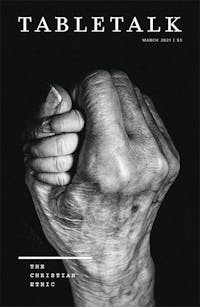
Request your free, three-month trial to Tabletalk magazine. You’ll receive the print issue monthly and gain immediate digital access to decades of archives. This trial is risk-free. No credit card required.
Try Tabletalk NowAlready receive Tabletalk magazine every month?
Verify your email address to gain unlimited access.
Pundits doggedly seek to persuade us to buy their interpretation of the world and their convictions of right and wrong. They burrow counsel into our ears, seeking a path to our hearts. Though as Christians we are outfitted to think with the mind of Christ, “plausible arguments” can still threaten to take us “captive” by ensnaring our lives in a moral web “not according to Christ” (Col. 2:4–8).
Thankfully, navigating life does not depend on us. God has given us His Word through His prophets and Apostles. In His Word, we find the reason for creation and promises for the future state of affairs. We understand God, man, sin, and salvation. God discloses His sovereign love, indefatigable forgiveness, and glorious grace. We discover divinity, dignity, depravity, and deliverance. He not only tells us why we die; He informs us how to live.
The Bible does not offer sage advice from a well-meaning but underinformed friend. Scripture is God’s very voice and “is to be received, because it is the Word of God” (Westminster Confession of Faith 1.4). Scripture confers the perfect wisdom of this all-knowing, sovereign God, Creator of the universe—who is, as His gracious Word proclaims, our heavenly Father. The “testimonies” of God are our “counselors” (Ps. 119:24); His “commandment makes me wiser than my enemies” (v. 98). Our Shepherd leads His flock to “green pastures” and “through the valley of the shadow of death” (Ps. 23:1–4). In His Word, our Father unambiguously expresses His righteous, all-wise will for His children.
But what about the Old Testament? Is it relevant today? One might wonder, since entire theological paradigms contend that the Mosaic law is essentially passé. Many assert the Old Testament is, well, old, and thus for a previous age. Any contemporary affinity for it is foolish, for it seeks refreshment from a dried-up well. After all, doesn’t the Apostle Paul rejoice that “Christ is the end of the law for righteousness to everyone who believes” (Rom. 10:4)?
Yes. Jesus is indeed the end (from the Greek word telos) of the law. In that we rejoice with the Apostle. But how should we understand Christ as “the end of the law,” and what does Paul actually celebrate? Does Paul leave Moses in the dust and view the Old Testament as barren land? Does Jesus, as living water, dissolve the moral law and its binding requirements? No, for Jesus’ being the end of the law means that He is the goal of the law, the One to whom it points and who fulfills it so that we can fulfill it in gratitude for His free grace.
the end of the law
In harmonious fashion, Moses, Jesus, and Paul reinforce the divine instruction given to Adam in the garden of Eden that only the one who obeys the law will live; the one who disobeys will die (Gen. 2:15–17). The sovereign Lord restates this point plainly to Moses: “You shall therefore keep my statutes and my rules; if a person does them, He shall live by them: I am the LORD” (Lev. 18:5). Paul embraces the permanent relevance of this life-and-death principle: “For Moses writes about the righteousness that is based on the law, that the person who does the commandments shall live by them” (Rom. 10:5).
We live in God’s world. We live before Him and for Him. And we all know it. Even gentiles who lack the benefit of the written law recognize their accountability to God as His image bearers, as those who have the law “written on their hearts” (Rom. 2:15). Before God’s Ten Commandments were inscribed on tablets, His law instructed the human heart. Self-consciousness consists of a divinely designed conscience that, deep down, knows the basics of God's moral law (1:18–20).
In considering our moral accountability, we encounter no stodgy legal code but the personal God. “For he who said, ‘Do not commit adultery,’ also said, ‘Do not murder’ ” (James 2:11, emphasis added). The written law codifies the personal mandates of the Creator. Christ renders greater clarity to God’s mandates, as He, who feasted on the will of His Father (John 4:34), mines the full depth and scope of the law’s demands on us (see Matt. 5–7). Westminster Confession of Faith 19.1 summarizes these demands crisply: “personal, entire, exact, and perpetual obedience” in thought, word, deed, motive, and goal.
These fertile demands of the law stand in stark contrast to the death-securing decadence of man throughout human history. Each iteration of biblical revelation heightens man’s doom: “The Scripture imprisoned everything under sin” (Gal. 3:22). But the plunging spiral of rebellion is countered by the building anticipation in the progression of the Old Testament, which assures a coming Son who will once for all perfectly keep the law of God.
This long-awaited Son, as the Gospels uniformly attest, is none other than Jesus of Nazareth. Born under the law (Gal. 4:4), the Son of God alone obeyed it fully. By observing its deepest demands, He perfectly fulfilled the law of His Father (Matt. 5:17, 48). Yet this perfect Son, rather than entering life, dies. How, with the unswerving biblical promise of life by obedience to God’s law, can this perfect Son die?
Here lies the treasure of the holy gospel—its grace, glory, and calling unto righteousness. The perfect Lawgiver became the perfect Lawkeeper, yet suffered the law’s curse as lawbreaker because of the willfully personal, entire, exact, and perpetual disobedience of His people. Our covenant Head, the Lord Christ, suffered, bled, and died for us. “For our sake he made him to be sin who knew no sin, so that in him we might become the righteousness of God” (2 Cor. 5:21).
In keeping with the law, the Son obeyed His Father’s moral bidding to secure His Father’s purpose: redeeming and consecrating His elect people. Flawless fidelity to the law and full subjection to the law’s punitive sanctions qualified Him as the Mediator and Deliverer of God’s people. He lived, died, and then rose again that His people might live. Vindicated by the Father at His resurrection from the dead, the Savior gives His church His own holy, life-giving resurrection power (Eph. 1:15–23). By His Spirit, Christ ensures that we will “be holy and blameless before him” (v. 4) and live as “the Holy People, the Redeemed of the LORD” (Isa. 62:12), the people in whom God’s Word dwells richly (Col. 3:16).
the law and ceremony
But what of the religious ceremonies God gave His Old Testament people? If the law is our holy guide, should we still have an altar in our church, a priest to provide daily sacrifices, a calendar preserving feasts and festivals?

In one sense, yes, we should. And, in fact, we do—in a manner more splendid than our Old Testament forefathers experienced. Old covenant religious ceremonies were never intended to operate in perpetuity or as an end in themselves but were instituted with a view to their completion, their end in the One who would pour out His life to fill the law’s religious and typological vessels to overflowing.
Old covenant worship activities had Christ as goal. That is, each mandate—feasts, festivals, sacrifices, and tabernacle/temple contents—looked to Christ. Old Testament ceremony was temporary because it was anticipatory. When Jesus completed His work, ceremonial law comes to its end, not because the practices were pointless but precisely because He is their point. Christ was the law’s anticipation; Christ is its end—its goal. Insofar as we worship the Christ of Scripture, the Son of God who is the end or goal of the law, each element of old covenant ceremony is ours in permanent abundance.
the living and abiding word
So then, every New Testament Christian is an Old Testament Christian. The holiness to which Christ saves us is defined by the law. No other standard will do. To put it differently, the Son of God obeyed the law so that the sons of God are by the Spirit of the risen Christ made alive and called and equipped to obey the law. Christ, then, is the end of the law for us, so that by His Spirit, He will attain the end of the law in us. Without Christ’s holiness, according to God’s revealed authoritative standard, no one—at any age in human history—will see the Lord (Heb. 12:14).
God’s Word is “living and abiding”; it “remains forever” (1 Peter 1:23, 25). His Word gives life (Ps. 119:25). To make light of the moral mandates of God in the Old and New Testaments is to make light not only of God’s Word but also of God’s Christ. To oppose the law of God in any way is to oppose the Savior in every way; the antinomian spirit, which says the moral law is in no way still binding, is an anti-Christ spirit. By contrast, the soul of the sanctified person delights in Christ and the law that He loves. As fully forgiven and justified sons of God, we are graciously cloaked in robes of His righteousness, not the regalia of rebellion. We are blanketed generously with Christ’s seamless righteousness, not teased with sheer fabric of moral ambiguity or indiscretion.
Thus, Christ has so clothed us with gleaming garments of righteousness that we walk according to His Spirit (Rom. 8:9–17; Gal. 5:16–26). In stride with our living and life-giving Savior, Lord, and Brother, the people of God affectionately resonate with His voice: “When I think of your rules from of old, I take comfort, O LORD” and “Oh how I love your law! It is my meditation all the day” (Ps. 119:52, 97).
